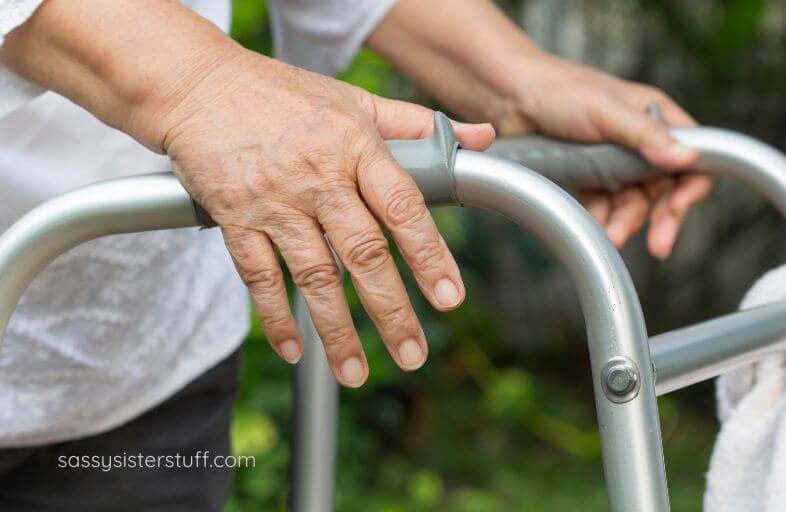10 Warning Signs Your Elderly Parents Might Need Help
When women reach middle-age, they often find themselves faced with the challenge of dealing with aging parents. It’s just something that happens at a certain stage of life. But being knowledgeable and well-prepared can help you better manage what’s ahead.
Recognizing the signs that your elderly parents might need assistance is an essential part of ensuring their safety, well-being, and quality of life. Ignoring these signs could lead to injuries and other serious consequences.
You may notice your parents struggling with daily tasks, showing changes in mood or behavior, or experiencing mobility challenges. Recognizing these signs early allows you to step in before minor issues escalate into major concerns requiring constant care.

In this article, we’ll explore the top 10 signs that your elderly parents need help. From physical changes to financial red flags, these insights can guide you toward understanding the care and support they need—while preserving their dignity and independence as long as possible.
Top 10 Signs Your Elderly Parents Need Help
Aging is a natural process, but it often brings changes that impact your parents’ ability to manage daily life independently. Many of these changes, like memory issues or difficulty completing keeping the house clean, are typical components of cognitive decline.
Over time, activities of daily living—such as cooking, cleaning, or managing medications—can become more challenging, and you might notice warning signs that they need extra help.
Recognizing these signs early can be key to preserving your parent’s quality of life. Sometimes, a little additional help—like grocery shopping, meal preparation, or medication reminders—can allow them to remain in the comfort of their own home while giving you peace of mind.
Recognizing these warning signs can guide you in exploring care options that promote their safety, well-being, and independence.

1. Difficulty Managing Daily Tasks
As your parents age, you might notice them struggling with basic chores that once came easily to them. Tasks like cooking meals, cleaning the house, or keeping up with paying bills on time can start to feel overwhelming.
These difficulties can be subtle at first—perhaps a pile of unopened mail on the counter or expired food in the fridge—but they’re important signs to watch for.
Daily activities are essential for maintaining independence and a sense of normalcy. When your parents begin having trouble managing these tasks, it could be a sign of declining physical strength, cognitive changes, or even emotional overwhelm.
They may hesitate to admit they’re struggling because they don’t want to burden you or lose their independence. If you notice these challenges, consider offering gentle assistance.
How to Help
Start by discussing ways to make daily tasks easier, such as creating a simple schedule, setting up automatic bill payments, or helping them prepare meals in advance.
If necessary, professional assistance, like hiring a part-time caregiver or enlisting help from a trusted neighbor, can also help ensure their needs are met while preserving their dignity and independence. You may also want to consider seeking support from other family members.
2. Unexplained Weight Loss
Unexpected weight loss can be a sign of trouble. Your parent might lose interest in food or skip meals. Poor nutrition can result from difficulty cooking, shopping, or even chewing and swallowing.
Over time, this can lead to health issues like weakened immunity, fatigue, and further weight loss.
Pay attention to subtle signs like loose clothing, untouched groceries, or a lack of variety in their meals. Sometimes, emotional factors like depression or loneliness can also contribute to poor eating habits.
How to Help
Start by having a gentle conversation about their eating habits. Offer to help with grocery shopping or meal preparation. If cooking is too much for them, consider healthy ready-made meals or meal delivery services.
Encourage small, nutritious meals throughout the day rather than large portions. If chewing or swallowing is difficult, consult a healthcare provider for guidance.
A visit with a doctor or dietitian can also help rule out underlying medical issues and create a plan to improve their nutrition.

3. Changes in Personal Hygiene
Neglecting personal hygiene can be a red flag that your parent needs help. They might skip bathing, wear dirty clothes, or stop grooming themselves.
You might notice an unusual body odor, greasy hair, or stained and wrinkled clothing. These changes can happen for many reasons.
Physical challenges, like arthritis, can make it hard to manage buttons or zippers. Cognitive issues, such as memory loss, might lead them to forget hygiene routines.
How to Help
Talk to your parents with care and understanding. Avoid being critical or judgmental. Suggest small steps to make hygiene easier, such as installing grab bars in the bathroom or choosing simpler, adaptive clothing styles.
Offer help discreetly if needed, like doing laundry or helping with grooming supplies. If they seem resistant, enlist the support of a trusted healthcare provider or family member to address the issue gently.
4. Cluttered or Unsafe Living Environment
A once-tidy home becoming cluttered or dirty can be a warning sign that your aging parents need help. Piles of unopened mail, dirty dishes, or tripping hazards might signal that household chores have become too much for them to handle.
An unsafe living environment can pose serious risks, especially if your parent struggles with mobility or balance.
These changes might result from physical challenges, like difficulty bending or lifting. Cognitive decline can also play a role, making it harder to stay organized. In some cases, emotional issues like depression or anxiety may lead to neglecting the living space.
How to Help
It’s important for you or a family member to address safety concerns immediately, ie: clearing tripping hazards or organizing cluttered areas. Offer to help with specific tasks, such as cleaning or sorting mail, to make the process less overwhelming.
If household chores have become a significant challenge, consider hiring a cleaning service or arranging for regular help from a friend, family member, or caregiver.
Small steps can make their home safer and more comfortable without taking away their independence.

5. Memory Problems or Confusion
Forgetting appointments, losing track of familiar places, or repeating the same stories can be signs of memory issues or confusion.
You might notice missed doctor visits, unpaid bills, or difficulty recalling recent conversations. These changes can disrupt daily life and lead to increased frustration or stress for your parents.
While occasional forgetfulness is normal with aging, frequent memory lapses or confusion about familiar routines or locations may indicate a more serious issue, such as cognitive decline or the early stages of dementia.
How to Help
Encourage your parents to write down appointments or use reminders, such as calendars or smartphone alerts. Simplify their daily schedule to reduce confusion and stress.
If memory issues persist, consider scheduling a visit with their doctor to rule out underlying medical conditions.
Early intervention can provide helpful resources and strategies to manage cognitive changes while supporting their independence.
6. Unexplained Injuries or Mobility Issues
Frequent bruises, unexplained falls, or difficulty getting around are serious signs that your parent might need help.
You may notice marks on their body that they can’t explain or see them struggling to move around the house safely. These issues can put them at risk for more serious injuries, like broken bones or sprains.
Mobility problems can be caused by various factors, including physical limitations like arthritis, muscle weakness, or dizziness. Cognitive issues may also contribute to accidents if they forget where they are or lose their balance.
How to Help
Look for potential hazards around their home, like slippery floors or loose rugs, and make the necessary changes to improve safety. You can also suggest using mobility aids like walkers or canes to help them move more easily.
Offer assistance with tasks that involve movement, such as getting in and out of the car or walking longer distances. Their doctor may be able to prescribe treatments or therapies to improve mobility.

7. Social Isolation or Withdrawal
If your parent is avoiding friends, family, or activities they once enjoyed, it could be a sign of social isolation. They might stop attending social events, decline invitations, or even avoid phone calls from loved ones. This withdrawal can be a result of physical limitations, sadness, or simply feeling disconnected
Social isolation can lead to feelings of loneliness, which may also impact emotional or physical health. Without regular interaction, your parents may miss important opportunities for support or assistance from those who care about them.
How to Help
Reach out to your parents regularly, even if it’s just a quick phone call. Encourage them to reconnect with friends or join social groups that match their interests.
If getting out of the house is a challenge, explore virtual social activities, like online games or video chats. Offering to accompany them to social events or outings can also help them feel more comfortable re-engaging.
8. Mood Swings or Behavioral Changes
Unusual irritability, sadness, or signs of anxiety or depression can indicate emotional or mental health challenges. Your parent may seem upset more often, have sudden outbursts, or show a lack of interest in things they once enjoyed.
These mood changes could be a result of stress, health problems, or a decline in mental well-being. Sometimes, these changes can also point to conditions like depression or anxiety, which are common in older adults.
If these feelings persist, it’s important to address them early to improve quality of life and prevent further complications.
How to Help
Talk openly with your parents about their feelings. Offer reassurance and avoid pushing them to “snap out of it.” Encourage them to see a healthcare provider who can help assess their mental health.
Offer support in finding activities or routines that promote a positive mood, like light exercise, hobbies, or time with loved ones. In some cases, therapy or medication may be necessary to manage anxiety or depression effectively.

9. Difficulty Managing Medications
Managing medications becomes harder as people age, especially if they are dealing with multiple prescriptions or cognitive issues.
Forgetting to take medications, mixing up doses, or leaving prescriptions unfilled can have serious consequences for your parent’s health.
If they’re regularly missing doses or taking the wrong medication, it may lead to complications, worsening conditions, or even dangerous side effects.
It’s important to watch for signs that their medication routine is slipping. You may notice empty pill bottles left in strange places or pills scattered around the house.
How to Help
Consider setting up a medication management system. Using a pill organizer with labeled days of the week can make it easier to keep track of doses.
There are also automatic pill dispensers that can remind your parents when it’s time to take their medication.
If your parents are having trouble filling prescriptions, offer to help with ordering or picking up their medications.
In some cases, a visit to the doctor or pharmacist may be necessary to simplify the medication regimen and ensure they are taking the right doses.
10. Financial Mismanagement or Unusual Spending
Unpaid bills piling up, strange purchases, or sudden generosity can be signs that your parent is having trouble managing their finances.
You might notice late payment notices or unexpected credit card charges. In some cases, they may spend large sums on things they don’t need or make large donations to charities they haven’t supported before.
These behaviors could result from memory issues, cognitive decline, or emotional distress. Financial problems can also occur if your parent is struggling with depression, confusion, or feeling overwhelmed by managing bills and budgeting.
How to Help
Start by reviewing their financial situation. Offer to help organize bills, set up automatic payments, or create a simple budget to make things more manageable.
If needed, consider assisting with monitoring bank statements or credit card charges to ensure everything is in order. In some cases, enlisting the help of a financial advisor or a trusted family member can provide peace of mind and prevent further financial stress.

Final Thoughts
Taking action early can greatly improve your parent’s quality of life. By staying attentive and proactive, you can address potential issues before they become more serious.
Remember, you don’t have to do it alone. Use available resources to support both you and your parent as you navigate these changes together.
At some point, you may need to consider professional resources. In-home care services can assist with daily tasks, personal care, or help with home maintenance and yard work. Home health care professionals can manage medical needs, while offering the support your parent needs to live comfortably.
A geriatric care manager can guide you in making the best decisions for your parents’ care. You may decide that moving to a senior living community is appropriate if staying at home is no longer safe.
And one final personal tip from me to you—try to avoid arguing with your parents. It does not help the situation at all. I know from firsthand experience:)
You may find these Related Articles helpful as you navigate these years with your aging parents:
- A Comprehensive Caring for Aging Parents Checklist
- 79 Uplifting Quotes About Caring for Elderly Parents
Love to ALL! ~ Susan







